G2N10
GenElute™ Plant Genomic DNA Miniprep Kit
sufficient for 10 purifications
Sinónimos:
Plant Genomic DNA Miniprep, Gen Elute
About This Item
Productos recomendados
usage
sufficient for 10 purifications
greener alternative product characteristics
Inherently Safer Chemistry for Accident Prevention
Learn more about the Principles of Green Chemistry.
sustainability
Greener Alternative Product
greener alternative category
storage temp.
15-25°C
¿Está buscando productos similares? Visita Guía de comparación de productos
Categorías relacionadas
General description
Application
- in isolation of arbuscular mycorrhizal (AM) fungal spores DNA
- in the purification of cetyl trimethyl ammonium bromide (CTAB)-extracted genomic DNA
- in genomic DNA isolation from leaves
- PCR
- restriction endonuclease digestion
- cloning
- Southern blots
Features and Benefits
- Starting material: Up to 100 mg of plant tissue
- Expected yield: Up to 20 μg
- Elution volume: 100 - 200 μl
- Time required: < 40 min
- RNase treatment required: No
Principle
Other Notes
Legal Information
Los componentes del kit también están disponibles por separado
- C2112Column Preparation SolutionSDS
Optional
Related product
signalword
Danger
hcodes
Hazard Classifications
Acute Tox. 4 Inhalation - Acute Tox. 4 Oral - Aquatic Chronic 3 - Eye Dam. 1 - Skin Corr. 1C
supp_hazards
Storage Class
8A - Combustible corrosive hazardous materials
flash_point_f
Not applicable
flash_point_c
Not applicable
Certificados de análisis (COA)
Busque Certificados de análisis (COA) introduciendo el número de lote del producto. Los números de lote se encuentran en la etiqueta del producto después de las palabras «Lot» o «Batch»
¿Ya tiene este producto?
Encuentre la documentación para los productos que ha comprado recientemente en la Biblioteca de documentos.
Los clientes también vieron
Protocolos
This protocol describes a simple and convenient procedure to isolate pure DNA from a variety of plant species using the GenElute Plant Genomic DNA Miniprep Kit.
GenomePlex® Whole Genome Amplification has been used to amplify genomic DNA from soybean, corn, tomato, purple coneflower, and ginseng.
Nuestro equipo de científicos tiene experiencia en todas las áreas de investigación: Ciencias de la vida, Ciencia de los materiales, Síntesis química, Cromatografía, Analítica y muchas otras.
Póngase en contacto con el Servicio técnico








